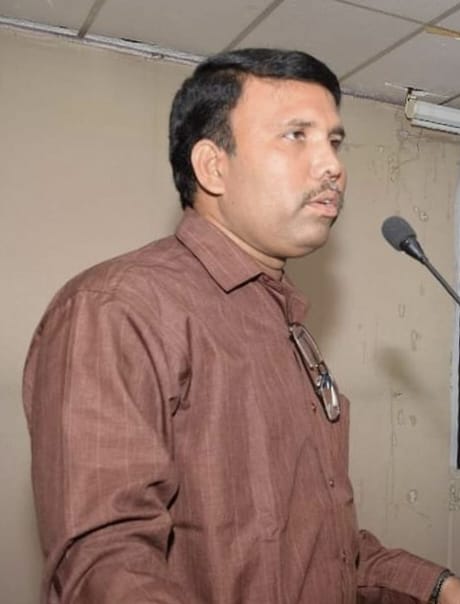About
Vision
Mission
Objective
About The College
Administration

Dr. R. Ravi Principal
PRINCIPAL’S MESSAGE
Governing Council
The Governing Council of our College of Education is the guiding force behind our institution’s vision for academic excellence and institutional integrity. Comprising seasoned professionals from diverse backgrounds, the Council diligently oversees strategic planning, policy development, and financial stewardship, ensuring that our educational mission remains at the forefront of all decision-making processes. With a steadfast commitment to promoting innovation, community engagement, and ethical conduct, the Governing Council plays a vital role in shaping the future of our college and empowering generations of educators to make a meaningful impact in the field of education.
Research Advisory Committee (RAC)
Research Advisory Committee (RAC) is typically established within academic institutions, engaged in research activities. In Michael Job Memorial College of Education for women, the Research Advisory Committee (RAC) serves as an important entity to support and enhance research endeavours related to education. The primary purpose of an RAC is to provide guidance, oversight, and expertise to ensure the quality, relevance, and ethical conduct of research projects undertaken within the organization.
1. Composition: The RAC comprises faculty members, researchers, and possibly external experts with diverse backgrounds in education, pedagogy, psychology, curriculum development, assessment, and related fields. The committee may also include representatives from other departments within the college or from external institutions.
2. Guidance and Mentorship: The RAC provides guidance and mentorship to faculty members, researchers, and students engaged in research activities. This includes assisting with research proposal development, methodological considerations, literature reviews, data analysis techniques, and interpretation of findings.
3. Research Proposal Review: The RAC reviews research proposals submitted by faculty members, researchers, and students within MJCOE. It assesses the feasibility, significance, methodological rigor, and ethical considerations of proposed research projects, providing feedback and recommendations for improvement.
4. Ethical Oversight: Ensuring ethical conduct in research is paramount. The RAC reviews research protocols involving human subjects, ensuring compliance with ethical standards, institutional policies, and regulatory requirements. It may also provide guidance on obtaining necessary approvals from institutional review boards (IRBs) or ethics committees.
5. Resource Allocation: The RAC may play a role in allocating research resources, including funding, facilities, equipment, and research assistants. It helps prioritize research projects based on their alignment with the college’s strategic priorities, potential impact on education practice or policy, and available resources.
6. Promotion of Research Culture: The RAC works to cultivate a culture of research excellence within MJCOE. This includes organizing research seminars, workshops, conferences, and other events to facilitate knowledge sharing, collaboration, and networking among faculty members, researchers, and students.
Anti Ragging Committee
Library Advisory Commitee
The Library Advisory Committee plays a vital role in guiding the strategic direction, enhancing the quality, and ensuring the relevance of library services and resources in a College of Education. By collaborating with library staff and engaging with the committee helps create an enriching and supportive learning environment that fosters academic success and research excellence.
RAC Commitee
1. Composition: The RAC comprises faculty members, researchers, and possibly external experts with diverse backgrounds in education, pedagogy, psychology, curriculum development, assessment, and related fields. The committee may also include representatives from other departments within the college or from external institutions.
2. Guidance and Mentorship: The RAC provides guidance and mentorship to faculty members, researchers, and students engaged in research activities. This includes assisting with research proposal development, methodological considerations, literature reviews, data analysis techniques, and interpretation of findings.
3. Research Proposal Review: The RAC reviews research proposals submitted by faculty members, researchers, and students within MJCOE. It assesses the feasibility, significance, methodological rigor, and ethical considerations of proposed research projects, providing feedback and recommendations for improvement.
4. Ethical Oversight: Ensuring ethical conduct in research is paramount. The RAC reviews research protocols involving human subjects, ensuring compliance with ethical standards, institutional policies, and regulatory requirements. It may also provide guidance on obtaining necessary approvals from institutional review boards (IRBs) or ethics committees.
5. Resource Allocation: The RAC may play a role in allocating research resources, including funding, facilities, equipment, and research assistants. It helps prioritize research projects based on their alignment with the college’s strategic priorities, potential impact on education practice or policy, and available resources.
6. Promotion of Research Culture: The RAC works to cultivate a culture of research excellence within MJCOE. This includes organizing research seminars, workshops, conferences, and other events to facilitate knowledge sharing, collaboration, and networking among faculty members, researchers, and students.
NSS
Integrating NSS in to MJCOE provides students with valuable opportunities to engage in meaningful community service, develop essential skills and competencies, and cultivate a sense of civic engagement and social responsibility that aligns with the ethos of teacher education. It also fosters a deeper understanding of educational issues and challenges faced by diverse communities, thereby preparing future educators to be socially conscious and empathetic professionals.
YRC
Youth Red Cross program plays a vital role in empowering young people to become agents of positive change in their communities. By engaging in humanitarian service, health promotion, and community development activities, YRC volunteers contribute to building healthier, safer, and more resilient societies while developing valuable skills and qualities that benefit them personally and professionally.
RRC
Establishing a Red Ribbon Club in MJCOE provides students with valuable opportunities to contribute to public health promotion, social justice, and community development. By engaging in HIV/AIDS prevention and advocacy activities, student teachers develop essential skills in communication, leadership, and empathy, preparing them to become socially responsible educators and advocates for positive change in society.
Students Grievance Redressal Committee
The SGRC plays a crucial role in maintaining a harmonious and supportive environment within our educational institution by addressing concerns and conflicts in a fair and transparent manner. Here’s a general outline about our Student Grievance Redressal Committee.
